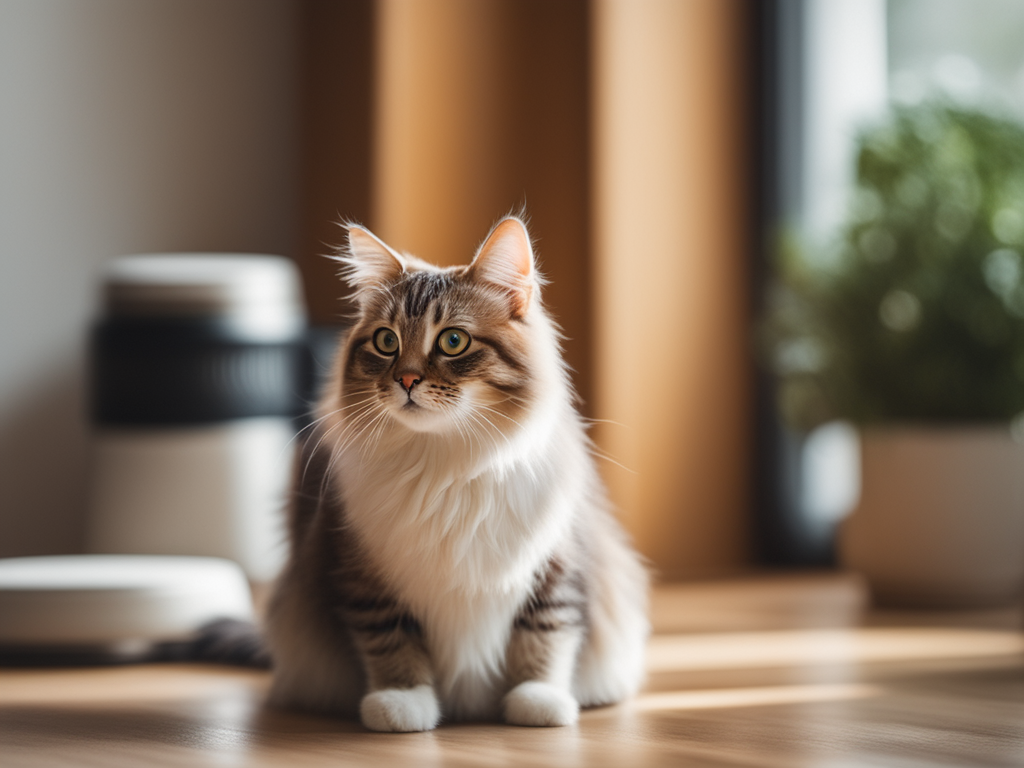How Do I Get My Cat To Stop Spraying In The House

How Do I Get My Cat To Stop Spraying In The House: Did you know that spraying is a common behavior in cats, especially those that are not spayed or neutered? If you’re tired of dealing with those pungent odors and frustrating stains around your house, you’re in the right place. In this discussion, we’ll explore effective strategies that can help you put an end to your cat’s spraying habits. From understanding the reasons behind this behavior to creating a stress-free environment, we’ll cover everything you need to know. So, if you’re ready to reclaim your home and enjoy a harmonious relationship with your feline friend, let’s get started.
Understanding Spraying Behavior
To gain a deeper understanding of spraying behavior in cats, it is important to differentiate it from urinating outside the litter box as it involves marking territory rather than simply relieving themselves. Spraying is a behavioral instinct in which cats release urine on vertical surfaces to communicate with other animals. Unlike regular urination, spraying is not a result of a full bladder; instead, it is a deliberate act of marking their turf.
When a cat sprays, it leaves behind a unique scent that serves as a form of communication. By spraying urine on vertical surfaces such as walls or furniture, cats are effectively marking their territory and sending messages to other animals in the area. This behavior can be triggered by various factors, including stress, mating behavior, marking new territory, or changes in routine.
Understanding the underlying cause of spraying behavior is crucial in addressing the issue. If your cat is not using the litter box consistently, it is essential to rule out any medical conditions that may be causing discomfort or pain during urination. Consulting a veterinarian can help identify and address any medical issues that may be contributing to the spraying behavior.
To help stop spraying behavior, it is important to create a stress-free environment for your cat. Neutering male cats can significantly reduce their urge to spray, as it decreases their testosterone levels. Additionally, providing environmental enrichment, such as vertical scratching posts and interactive toys, can help alleviate stress and provide alternative outlets for marking behavior.
Using pheromone diffusers, such as Feliway, can also help in preventing spraying. These diffusers release synthetic pheromones that mimic the natural facial pheromones produced by cats when they feel safe and secure. By creating a calming environment, pheromone diffusers can help deter spraying behavior.
In addition, making the previously marked spot a happy place for your cat can discourage further spraying. By placing food, water, or a comfortable bed in the area, you can change the cat’s association with that spot from marking territory to a positive space.
Understanding spraying behavior is the first step in addressing and stopping this unwanted behavior. By implementing these strategies, you can help your cat use the litter box consistently and create a harmonious environment for both you and your feline friend.
Identifying the Reasons for Spraying
Understanding the reasons behind your cat’s spraying behavior is essential in addressing and resolving this unwanted behavior. Spraying, also known as urine marking, is a common issue among cats, and there can be various factors contributing to this behavior. It is important to rule out any underlying medical conditions before assuming it is solely a behavioral problem.
One of the primary reasons your cat may be spraying is to mark its territory. Cats have scent glands in their paws and cheeks, as well as in their urinary tract. By spraying, they are leaving their scent on different areas to communicate with other cats. This behavior is more common in unneutered males, as they are driven by their natural instincts to mark their turf.
Another reason your cat may be spraying is if it feels threatened or stressed. Cats can become anxious due to changes in their environment, such as the introduction of a new pet or a move to a new house. Additionally, outdoor cats or the presence of outdoor cats near your home can trigger spraying behavior as your indoor cat tries to establish its territory.
In some cases, spraying can be a sign of a medical condition, such as urinary tract infections or bladder stones. These conditions can cause discomfort and increase the amount of urine produced, leading to spraying behavior. If you suspect a medical issue, it is important to take your cat to the vet for a thorough examination.
Understanding the reasons behind your cat’s spraying behavior is the first step in addressing and resolving this issue. By identifying the underlying cause, you can take appropriate measures to help reduce or eliminate spraying. In the next section, we will discuss practical solutions to stop your cat from spraying in the house.
Creating a Stress-Free Environment
To create a stress-free environment for your cat, it is important to establish a consistent routine for feeding, sleeping, and litter box cleaning. Cats thrive on routine and structure, so having a predictable schedule can help reduce their stress levels. Make sure to feed your cat at the same time each day, provide a quiet and comfortable sleeping area, and clean the litter box regularly.
In addition to a consistent routine, providing vertical spaces and hiding spots for your cat can also help reduce anxiety and territorial behavior. Cats need vertical territory to feel safe and secure, so consider adding cat trees or shelves where your cat can climb and observe their surroundings. Providing hiding spots such as cozy beds or enclosed spaces can also give your cat a sense of security and help them feel more relaxed.
Using synthetic pheromone diffusers or sprays designed to calm cats can be particularly helpful during times of big changes in the household. These products mimic the natural pheromones that cats release when they feel safe and secure. By using them, you can help your cat feel more at ease and reduce their stress or anxiety.
It is also crucial to ensure a clean litter box and use the litter that your cat prefers. Cats are very particular about their litter boxes, and if they don’t find them clean or comfortable, they may start spraying to mark their territory. Thoroughly clean any areas where your cat has been sprayed with an enzymatic cleaner to remove the scent of cat urine. This will discourage them from returning to that spot.
Spaying or Neutering Your Cat
Spaying or neutering your cat is the most reliable method to prevent marking behavior and reduce the likelihood of spraying in your home. Cats spray to mark their territory, and this behavior is more common in intact cats. By getting your cat spayed or neutered, you can eliminate the hormonal urge to mark and decrease the chances of spraying.
There are several reasons why cats spray, including stress, anxiety, or the presence of other cats in the area. If you have a new cat in your home, it’s essential to give them time to adjust and establish their territory. Providing stress relief through play, petting, and new toys can help reduce spraying.
Another practical solution is to try using a synthetic pheromone spray or diffuser. These products mimic the scent that cats leave behind when they rub against objects to mark their territory. By spraying or diffusing these synthetic pheromones in the areas where your cat has sprayed, you can help create a more familiar and secure environment.
Changing the type of litter or litter box location can also discourage spraying. Cats are sensitive to changes in their environment, and sometimes a simple adjustment can make a significant difference. Additionally, cleaning marked areas with an enzyme-based, scent-neutralizing cleaner can remove the scent of previous markings and discourage your cat from spraying in those spots again.
Lastly, closing the blinds or using window coverings to prevent your cat from seeing other cats outside may help reduce spraying behavior. Cats can become territorial when they see other cats through windows, so limiting their exposure to potential triggers can be beneficial.
Seeking Veterinary Assistance
If you have tried the previous methods to stop your cat from spraying and are still facing issues, it may be time to seek veterinary assistance to address any underlying medical causes or behavioral concerns. Sometimes, cats may spray as a result of medical problems, such as urinary tract infections or bladder issues. By scheduling a veterinary check-up, you can rule out any potential medical issues that may be causing your cat to spray.
Additionally, seeking veterinary assistance can help you determine if spaying or neutering your cat is necessary. Unneutered male cats are more likely to spray, especially when they reach sexual maturity. Neutering your cat before he is 6 months old increases the chances of stopping spraying behavior. In fact, approximately 87% of older cats stop spraying after being neutered.
During your veterinary visit, it is also important to discuss any behavioral concerns you may have. A veterinarian or behavior expert can provide guidance on how to modify your cat’s behavior and prevent future spraying episodes. They may recommend using enzymatic cleaners to remove pet odors, as the scent of cat pee can trigger spraying behavior. Additionally, they can provide tips on creating a comfortable and stress-free environment for your cat, as stress is often a contributing factor to spraying.
If your cat has sprayed outside of the litter box, it is crucial to address the issue promptly to prevent it from becoming a recurring problem. Seeking veterinary assistance will not only help identify and treat any underlying medical issues but also provide you with expert advice on how to effectively manage and prevent spraying behavior in your cat or other animals in your household.
How Do I Get My Cat To Stop Spraying In The House Frequently Asked Questions
How Do I Stop My Cat From Spraying Indoors?
To stop your cat from spraying indoors, incorporate effective deterrents, practice behavioral modification, provide environmental enrichment, use positive reinforcement, understand territorial behavior, identify stress triggers, maintain litter boxes consistently, try pheromone sprays, seek veterinary advice, and explore medication options if necessary.
Why Is My Cat Spraying in the House?
Cats may spray indoors due to territorial behavior, stress, or anxiety. Signs include urine marking on vertical surfaces and strong odor. Create a cat-friendly environment, consider spaying/neutering, use natural remedies or pheromone sprays, and seek professional help if needed.
How Do You Discipline a Cat for Spraying?
To discipline a cat for spraying, use effective deterrents like double-sided tape or aluminum foil on sprayed areas. Understand the reasons behind spraying and use positive reinforcement techniques. Create a stress-free environment and consider natural remedies. Seek professional help if needed.
What Can I Spray in My House to Stop My Cat From Spraying?
To stop your cat from spraying in the house, try using natural deterrents, behavior modification techniques, and cat-friendly pheromone sprays. Create a cat-friendly environment, consult a professional for advice, and be consistent and patient in your approach.
Conclusion
In conclusion, addressing the underlying reasons for spraying behavior and creating a stress-free environment for your cat are key to stopping this behavior. Providing playtime, petting, and new toys can help relieve stress while cleaning marked areas and repurposing them for positive activities can discourage spraying. Spaying or neutering your cat is highly recommended, as it is the most effective method to prevent marking. If the problem persists, seeking veterinary assistance can provide additional guidance and support.








